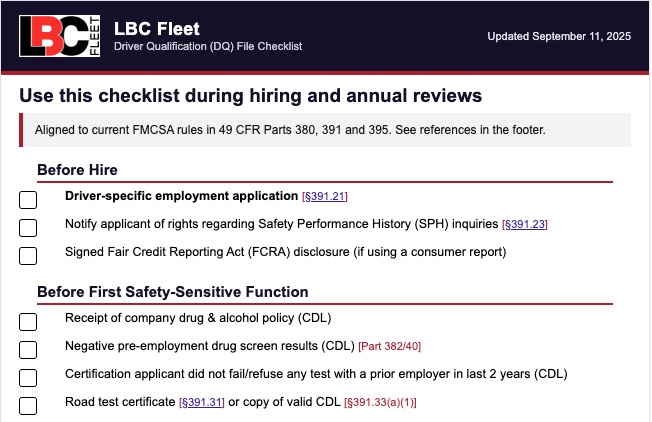Driver Qualification File Management
Professional driver qualification file management services for fleet operators. Every commercial motor vehicle driver under your DOT authority must have a complete Driver Qualification File, or DQ File. Our expert driver qualification file management ensures these files verify your drivers' legal and medical fitness to operate and protect your operation during DOT audits.

We handle licensing, documentation, and filing for you, and we will clean up past quarters.
1 Click
MVR's, Background Checks and Drug Tests
Automated Contact
On expiring items w/ manager escalation
Trusted Experts
Industry experts & trained account specialists
DQ File Compliance Checklist
Download our comprehensive Driver Qualification File checklist with FMCSA requirements and best practices your team can use.
What Must Be Included in a Driver Qualification File
Under 49 CFR §391.51, a DQF must include each driver's:
- Signed application for employment and work history (§391.21)
- Motor vehicle record (MVR) from each state where the driver held a license in the past three years (§391.23, §391.51)
- Road test certificate or CDL equivalent (§391.31, §391.33)
- Annual driving record review, with date and reviewer noted (§391.25)
- Medical Examiner's Certificate and verification that the examiner is on the National Registry (§391.43, §391.51)
- Skill Performance Evaluation or medical exemption documentation, if needed (§391.49)
Learn more: FMCSA DQ File Requirements
Who Needs a Driver Qualification File (DQ File)?
Any driver who operates a commercial motor vehicle (CMV) in interstate commerce must have a Driver Qualification File (DQ File) under FMCSA Part 391. This applies to CDL and non-CDL drivers alike. If a driver fits any of the categories below, a DQ File is required:
Weight threshold: Vehicles with GVWR/GCWR or actual weight of 10,001 lb or more—including non-CDL straight trucks, box trucks, service bodies, and pickups towing heavier trailers.
Passenger carriers: Vehicles designed or used to transport more than 8 passengers (including the driver) for compensation, or more than 15 passengers not for compensation (e.g., employee or church shuttles).
Hazardous materials: Any vehicle transporting hazardous materials that require placards.
CDL activities: Drivers of 26,001+ lb CMVs, combinations over 26,001 lb, or vehicles requiring passenger or hazmat endorsements. Learn more about CDL requirements.
Owner-operators: Even single-truck businesses must maintain their own DQF. If leased to a motor carrier, the carrier must maintain the DQF, but the owner-operator is still responsible for staying compliant.
Intrastate operations: Many states adopt Part 391 for intrastate carriers as well. If you run intrastate only, you may still need DQ Files depending on state rules and vehicle weight. (We can confirm your state's requirement in minutes.)

Key requirements
- Complete employment application
- Current MVRs from all states
- Valid DOT medical certificate
- Road test or CDL documentation
- Annual driving record reviews
- Safety performance history
Why DQ Files Matter and How to Avoid Costly FMCSA Violations
Incomplete or outdated Driver Qualification Files (DQ Files) are among the most common findings in FMCSA compliance reviews. Gaps like missing employment applications, expired DOT medical certificates, no documented annual MVR review, undocumented safety-performance history checks, or absent road-test/skills verification can trigger acute violations. The result isn't just fines—carriers risk failed audits, contract losses with shippers and brokers, insurance friction, and a weakened safety rating that follows you to your next bid.
A compliant DQ File should clearly show that each driver is qualified to operate a CMV today—not last year. That means complete hiring paperwork, pre-employment checks, medical and license status that are current, and annual driving-record reviews with evidence that you actually looked and acted on what you found. When those elements are tracked proactively, you shrink audit exposure, speed up document requests, and keep your operation moving.
DQ File issues we fix
- Expired or missing DOT medical examiner's certificates or status on the MVR
- No pre-employment MVR or annual MVR review on file
- Incomplete employment application or missing previous-employer safety performance history inquiries
- No road-test/skills documentation (or CDL equivalent)
- Unfiled updates after license changes, suspensions, or medical status changes
Centralized, Audit-Ready Driver File Compliance
We centralize and manage all your driver qualification (DQ) files, flag document expirations before they occur, and prepare clean, audit-ready packets for FMCSA, DoD, CHP, PUCs, and insurance providers.
With our system, you'll always know what's missing, what's due, and exactly how to respond when an investigator requests documentation.
Why Choose Our Driver Qualification File Management Services?
- Eliminate last-minute DOT compliance issues
- Avoid fines and out-of-service orders
- Maintain driver qualification files that are always FMCSA-compliant
- Reduce administrative burden with automated tracking and alerts
With our comprehensive DQ file management services, you gain peace of mind knowing your fleet's compliance is handled by experts who specialize in FMCSA regulations, DOT audits, and driver file maintenance.
How Our Driver Qualification File Management Process Works
Driver Onboarding Made Simple
As soon as you identify a new potential driver, notify us and we'll take over. Our compliance specialists:
- Assist applicants with questions
- Conduct employment verifications and clearinghouse checks
- Verify previous employers
- Manage drug testing and background screenings
- Flag any issues for your review
Ongoing File Maintenance & Expiration Tracking
We monitor all driver files in real time. Our system automatically:
- Sends drivers alerts 30 days before document expiration
- Contacts drivers directly if updates are missed
- Notifies your team if no response occurs, keeping you in control
Annual Reviews & Regulatory Updates
Our services don't stop at setup. We:
- Perform annual DQ file reviews
- Update records to meet current FMCSA and DOT requirements
- Ensure files are always compliant and audit-ready
We handle onboarding, maintenance, annual reviews, and compliance tracking. Let us manage your DQ Files so you can focus on running your operation.
Frequently Asked Questions
What is a Driver Qualification File (DQ File)?
A DQ File is an official record maintained by motor carriers to prove each driver meets DOT qualifications. It includes documentation like employment applications, MVRs, medical examiner certificates, and annual reviews.
Who needs a Driver Qualification File?
Every interstate motor carrier must maintain a DQ File for each commercial motor vehicle driver, including CDL and non-CDL drivers, owner-operators, and anyone transporting passengers or certain cargo.
What documents are required in a DQ File?
Required items include a signed employment application, MVRs, road test or CDL, annual record reviews, medical exam certificate, and skill performance or exemption documentation if applicable. View the DQ File Checklist
Why do DQ Files fail compliance?
DQ Files often fail compliance due to missing or outdated documentation, such as expired medical certificates, unchecked MVRs, or incomplete employment records—leading to fines and penalties.
How long must DQ File records be retained?
Active driver files must be maintained while the driver is employed. After a driver leaves, most records must be retained for three years. Specific documents like accident records and annual reviews have additional retention requirements under FMCSA regulations.
Can I maintain DQ Files electronically?
Yes, FMCSA allows electronic record retention as long as the records are readily accessible, secure, and can be produced during audits or roadside inspections. We provide secure cloud-based DQ File management that meets all federal requirements.
Want this off your plate?

LBC Fleet manages your driver qualification files and keeps them audit-ready. We handle onboarding, maintenance, and compliance tracking.
Resources: FMCSA DQ File Requirements, DQF Checklist, FMCSA.
